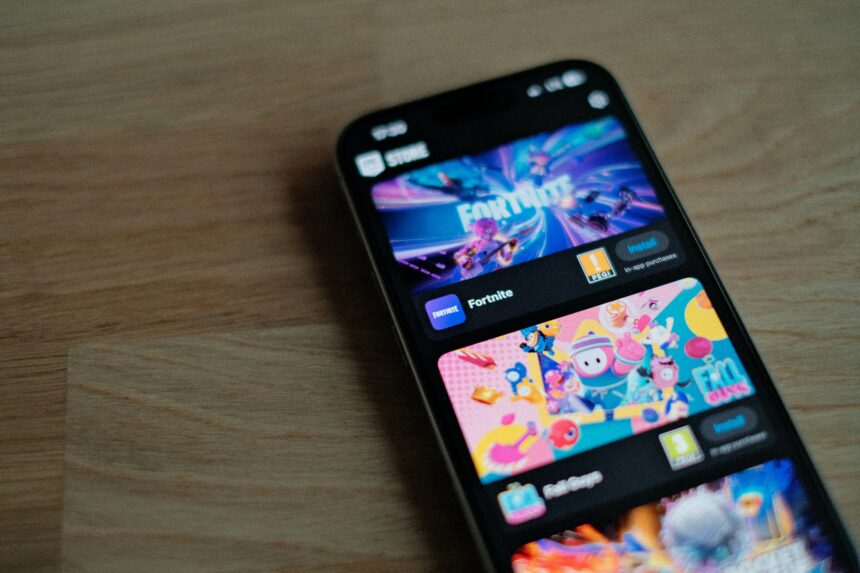Although we’re not covering any gaming-related news on our site, the lawsuit between Epic Games, Google, and Apple is something that we have to talk about. It’s that kind of news that, for better or worse, they’re going to bring huge changes to how we purchase, download, and install our games.
The highly restrictive nature of Google and Apple
For many years, both Google and Apple have not allowed companies and developers to submit their own marketplaces on the Play Store or App Store.
It was a decision that favored both companies from having any real competition while keeping a walled-garden approach that kept their ecosystems safe.
Apart from that, both stores came with high commission fees, meaning that if you’re a developer who submitted your app or game to any of those stores, you’d have to agree to their 15-30% standard fee commissions for each sale.
Not only that, but you were restricted to your payment methods, meaning that you could only follow their terms of use and policies and use their own billing system.
But the legal challenges didn’t begin until Epic Games decided to introduce a direct payment system on Fortnite. Basically, this move was bypassing the standard 15-30% commission fees charged by Google and Apple, leading to the removal of Fortnite from both the Play Store and App Store.
Epic Games has had enough, and to change things, they sued both Apple and Google.
The battle with Epic Games and Apple
The original court ruling in 2021 with Epic Games and Apple wasn’t exactly a success, and the judge sided with Apple in nine of the ten courts. That meant that, legally, Apple didn’t hold an illegal monopoly in the broader market, which was a total blow to Epic’s core argument.
However, the company did actually win one case when the judge found that Apple’s “anti-steering” policies were anti-competitive under California’s Unfair Competition law. Basically, this policy was all about preventing developers from telling their users that they had an alternative payment method outside of the app.
In response, Apple made some changes to its policies, but they were widely criticized as a form of “malicious compliance.” For example, while they allowed developers to link to external payment options, they still tried to impose a 27% commission on those transactions and created user interface hurdles (“scare screens”) that made the process difficult.
This led to further legal action. Epic filed a complaint arguing that Apple’s changes violated the spirit of the court’s injunction. In a more recent ruling in 2025, the judge agreed with Epic, finding that Apple had “willfully violated” the injunction.
This more recent ruling in 2025 has been a major victory for Epic. The court placed new, stricter restrictions on Apple, including:
- No Commission on External Payments: Apple is now banned from collecting revenue shares on purchases made through non-Apple payment methods.
- No Restrictions on Links: Apple cannot impose any restrictions on how developers present links to alternative payment systems.
As a result of this, Epic Games CEO Tim Sweeney declared that the “Apple tax” is now “just as dead here in the United States of America as they are in Europe.” He also stated that Fortnite would be returning to the App Store in the US.
The battle with Epic Games and Google
At the same time that Epic Games sued Apple, it did the same for Google. The initial trial took place in a federal district court in late 2023, and after a month of trial, the jury sided with Epic Games on all counts.
Google was found guilty of illegally maintaining a monopoly with its Play Store by using anti-competitive practices.
In July 2025, the Ninth Circuit Court of Appeals upheld the jury’s decision, and Google was found guilty of operating an illegal monopoly. The result? A few changes that, possibly, will change the entire Android ecosystem forever.
Here are some of the changes that Google has to make after the court ordered them:
- Allow third-party app stores: Google must allow alternative app stores (or marketplaces) to be submitted to the Play Store.
- Full access to the app catalog: Competing app stores must be given access to the full catalog of apps (everything that’s included on the Play Store).
- More billing systems: Developers are no longer forced to use Google’s in-app billing system for purchases, and instead, they can provide more alternative payment methods. Developers can also notify users that they now have more options when it comes to payments.
- Stopping anti-competitive deals: Google can no longer make certain deals, such as paying other companies or developers to pre-install the Play Store or block any other third-party app store.
- Transparency at its best: Developers can now tell their users about the availability and pricing of their apps outside the Google Play Store.
Tim Sweeney, the CEO of Epic Games, called this a “total victory”, and announced that the Epic Games Store is coming to the Google Play Store. Thankfully, that will result in higher competition and maybe, just maybe, may lead to lower commission fees for developers.
Although the legal battle isn’t over, that was a huge win for Epic Games and for all the app and game developers, third-party marketplaces, and everyone who’s been sickening of paying 15-30% commission fees per every purchase.
Paving the way for a more open app ecosystem
Many people may think that this legal battle will only favor Epic Games, but the truth is, they’re changing the rules of the game for everybody else.
That means that other app stores can also join and be submitted to the Google Play Store and Apple App Store, and use their own alternative billing systems.
And yes, there are a few great choices out there that we may end up seeing in the near future, and some of them are pretty great, too.
If you’re wondering who the lucky contenders are, here are a few popular names:
- Epic Games Store: Not only does this one have thousands of titles, but it also gives you two free games every week, making it an excellent option for every gamer.
- Samsung Galaxy Store: Samsung’s app store is one of the best for getting and updating your Android apps, and while some of them may come with more size, it’s fast, reliable, and very secure.
- Amazon Appstore: This is the primary app store for all Amazon devices, including Android. It has a wide range of apps and games, but unfortunately, considering the fact that many apps use the Google Play Services, they may be unavailable or unsupported, or even limited in features.
- Aptoide: This is the best option for people looking for open-source alternatives that are decentralized. Unlike other app stores, Aptoide comes with no geo-restrictions, everything’s free to download and install, and gives you access to apps that aren’t available elsewhere.
- F-Droid: A community-maintained repository of free and open-source software (FOSS) for Android users who are privacy-conscious and hate ads and trackers.
- AltStore: Who knew that Apple’s App Store isn’t the only big boy in the market? This one allows users to sideload apps onto their devices using their Apple ID, bypassing Apple’s official marketplace, but requires being “refreshed” every 7 days (meaning that you can only do that from the same Wi-Fi network).
- MacPaw’s Setapp: A subscription-based service for macOS and iOS that’s not cheap and has a limited collection of 250+ premium apps. The single subscription model simplifies software management and eliminates individual purchase costs, but it comes with a monthly subscription that’s only good if you’re using multiple of the apps found on their app store.
With that in mind, those app stores now have significantly higher chances of people finding them thanks to Epic’s lawsuit. It’s a game-changer era, and developers have more options when it comes to submitting their apps, especially if those marketplaces are available everywhere.
A high commission fee, like 15-30%, means that developers and companies alike make less money. With more options available, lower commission fees, fewer restrictions, and the same effectiveness that the Google Play Store and Apple App Store have provided for years, this change may potentially lead to more apps and better support.
Editor’s Note: I’ll be updating the article with more news and updates as the legal battle continues. Google is ready to make some huge changes, and we’ll be here to watch them as they happen.











